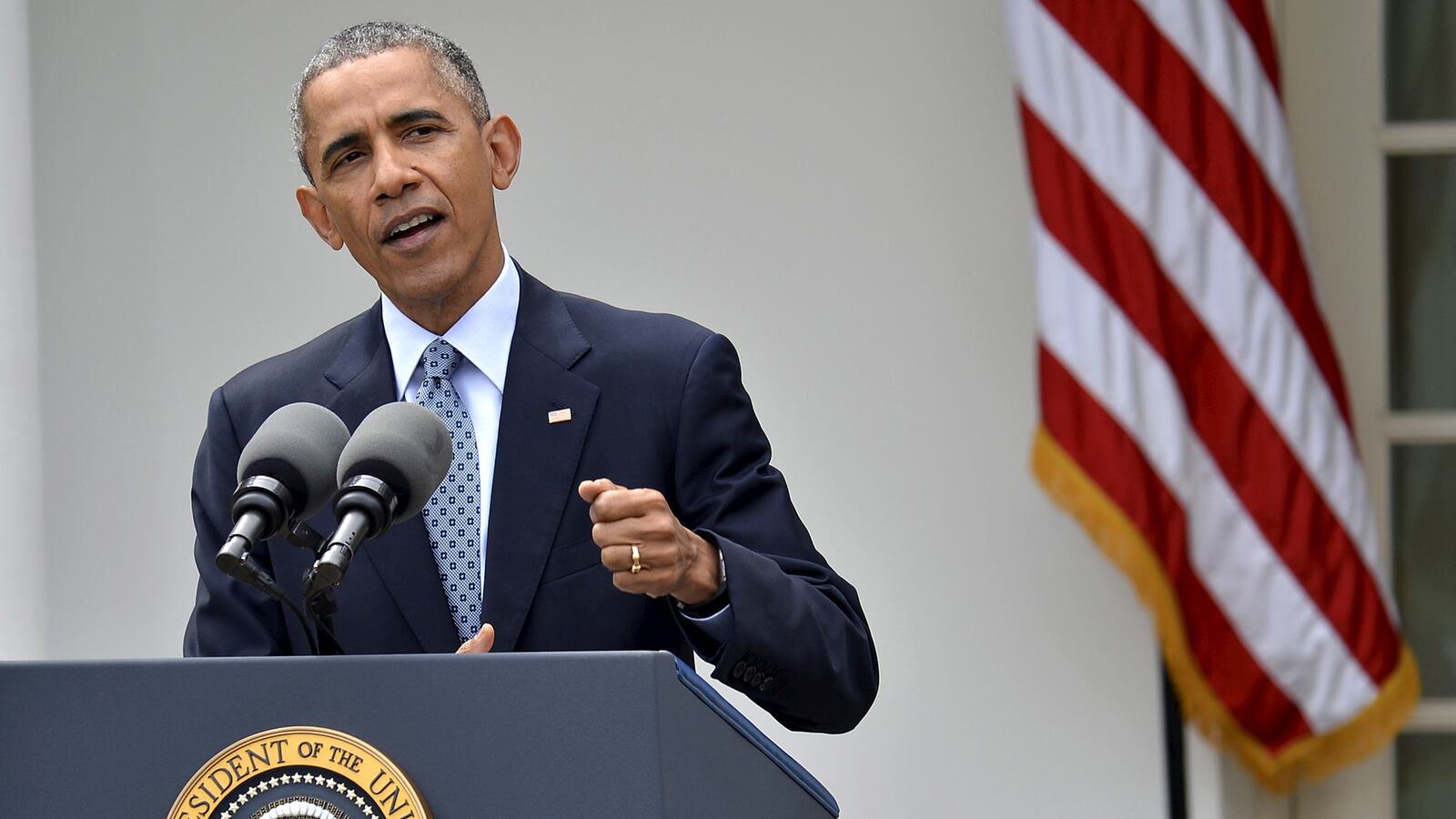The emerging arrangements on Iranian nuclear programs announced Thursday are a clear plus/plus for both sides. Only those who don’t want any deal see it otherwise.
The U.S. and its partners in the Swiss talks get a downsizing and overhaul of Iran’s nuclear facilities with strong inspection rights, stretching warning time to counter Iranian cheating from a couple of months to at least a year. Tehran gets the economic sanctions noose loosened.
But the pleasant surprise of this latest step toward the June 30 deadline obscures, for the moment, the real winners and losers, the new strategic possibilities and risks.
The real winners in this round of talks are the realists and pragmatists in both Washington and Tehran, and the losers are the ideologues and hawks. Totally unrealistically, the latter seek outright Iranian capitulation, even at much greater risks of war. The former—and this is critical—think the emerging pact is good, but far from Nirvana.
What they really are trying to establish is a strategic dialogue that will open the door to easing dangerous tensions throughout the Mideast. In private, that’s precisely what leaders on both sides have been saying. The key pragmatists are Iranian President Hassan Rouhani and Foreign Minister Javad Zarif, and President Barack Obama and Secretary of State John Kerry. The Americans are substantially backed in this approach by their negotiating partners—Britain, China, France, Germany, Russia, and the European Union.
What the realists on both sides want is a strategic dialogue that gets at underlying mutual hatreds, distrust, and the volatile issues of the Mideast region. But they can’t get to these strategic priorities without first reaching satisfactory accommodations on the nuclear issue. Politically, the nuclear issue comes first. Only then can they have the needed negotiations on the battles raging in Syria, Iraq, Yemen, and Libya, and between the Saudi-led Sunnis and the Iranian-led Shiites. Only then can they get at the now-dominant mutual suspicions.
America and Iran have real common interests. Iran and Washington worked together in the early stages of the Afghan war to fight the Taliban and al Qaeda. Both are waging war against the jihadis in Iraq and Syria. And American pragmatists, at least, see that their Saudi and Gulf state “friends” have actually done more to harm U.S. interests throughout that area than has Iran. The Gulf states are the very ones who supplied the jihadis with arms and money to make them the threat they’ve become. Riyadh has been the prime mover behind the madrassas that have preached hatred of America and its ways.
A huge chunk of Iranians, by contrast, are decidedly pro-American. They visualize good ties with America as the key to a better life economically and politically. They plead for better economic relations, although they are clear-eyed about the short-term benefits to the venal right-wing clergy who run the country. These Iranians flooded the airport on Friday to cheer Zarif on his return from Switzerland. According to the polls, a solid majority of Americans also favor improved relations with Iran.
Make no mistake, American realists are well aware of the risks being run in this emerging nuclear deal. They’re not realists for nothing. The biggest nightmare is that with economic sanctions mostly lifted over the next two or three years, the Iranian economy will be sufficiently strengthened to allow emboldened Tehran hawks to start cheating and take off the nuclear wraps. At that time, they might well calculate that the U.S. would no longer be in a position to re-impose most of the economic sanctions. The mullahs might conclude that Russia, China, and maybe even some Europeans would just accept Iran’s infidelities.
This is a nightmare shared by hawks and pragmatists alike, and the Obama team has got to show now that it is preparing for these risks. First, it’s got to carefully pace the lifting of the sanctions, American and international. Second, it’s got to prove that the inspection regimes to catch possible Iranian violations are strong. Nothing is air-tight, but inspection rights have to extend to agreed and non-agreed sites. Tehran has cheated before. Third, it has to work out with its partners now a plan for reacting strongly, immediately, and jointly to possible violations. And this plan has to be announced before the final pact is concluded.
Mr. Obama should not assume that the nuclear negotiations with Iran speak for themselves. He’s got to explain how he wants them to affect future overall relations with Iran. Then, and critically, he’s got to cast Iran in terms of his overall Middle East strategy. Washington’s traditional friends and partners in the region—the Gulf states, Jordan, Egypt, and above all, Israel, have to see how emerging relations with Iran fit into the whole picture. Mr. Obama has to explain how their interests will be protected. Convincing these friends in the area is also absolutely essential to convincing congressional critics that his Iran policy makes sense.
He made a good start Thursday with his emphasis on how what he’s trying to do with the nuclear deal is far better than the alternatives. But that’s not enough.
Specifically, Mr. Obama has to put together a plausible policy on the following issues: Will the U.S. simply support the Saudi play in Yemen or try to play a peace-making role? What’s the plan for defeating ISIS, not just the pipe dreams? How can the U.S. help to get Israeli-Palestinian talks back on track?
To be persuasive in dealing with these problems, Mr. Obama has to reassure Israelis that the American commitment to their security is as strong as ever.
American and Iranian realists won this last round by the slimmest of margins. The hawks on both sides are politically stronger than the realists. That’s why these talks in Lausanne went beyond the deadline and why the final results were in so much doubt. From here until the June 30 deadline, realists on both sides have to continue helping each other or they will fail.
RELATED:
Iran Deal: Don’t Pop The Champagne Yet





